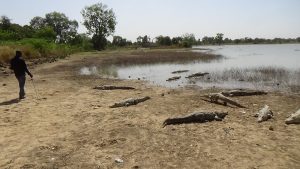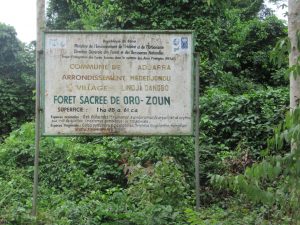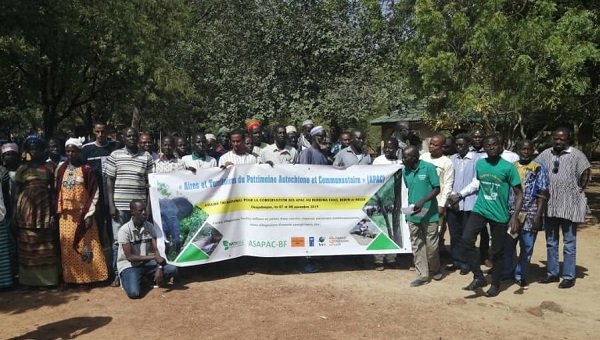First published on 11/08/2019, and last updated on 09/17/2020
By Patrice Akiam, Honorary member of the ICCA Consortium.
A workshop on ICCAs in Burkina Faso and Benin brought together many Consortium actors from both countries, as well as supporters, partners and resource persons. It was an opportunity to raise the visibility of ICCAs, discuss community governance dynamics, identify threats and possible solutions and formulate recommendations to states, NGOs and communities.
The workshop on territories and areas conserved by Indigenous peoples and local communities (ICCAs) in Burkina Faso and Benin was held on 7 and 8 November 2019 in Ouagadougou, Burkina Faso. It brought together representatives of ICCAs, Honorary members of the Consortium, resource persons interested in the issue of ICCAs as well as representatives of NGOs that are active in the promotion of community governance in Burkina Faso and that support ICCAs in Benin and Burkina Faso.
The workshop was organised by the National ICCA Association of Burkina Faso (ASAPAC-BF), with support from the NGO NATUDEV (ICCA Consortium Member).
Giving visibility to ICCAs in the media and public opinion
The objective of this activity was to introduce ICCAs to public opinion to raise their profile and engage more stakeholders in supporting and promoting the conservation of biodiversity and grassroots communities’ cultural heritage.
The opening ceremony was covered by several media outlets in Burkina Faso, led by Alternative Communication Cabinet. Interviews were conducted on the sidelines of the opening ceremony with the President of NATUDEV, the spokesperson for the General Director of Water and Forests of Burkina Faso and a representative of ICCAs’ guardian village communities in Burkina Faso.
Rich exchanges on ICCAs and the dynamics of community governance
During these two days, the activities focused on:
- The presentation of ICCAs in Burkina Faso and the Sahel region;
- The state of ICCAs in Benin;
- The presentation of experiences related to the Convention on Biological Diversity (CBD) and community governance of biological diversity in Burkina Faso;
- The sharing of experiences on the management of community sites;
- The presentation of funding opportunities;
- A summary of texts on the management of community sites in Burkina Faso;
- Exchanges and discussions on the presentations;
- The formulation of recommendations by all participants; and
- A visit to an ICCA and its customary managers, called Bangré-wéogo Urban Park in the heart of Ouagadougou.
Presentation of ICCAs in Burkina Faso and the Sahel region
Following the opening ceremony, Dr Alexis Kaboré, President of NATUDEV and ICCA Consortium Regional Coordinator for the Sahel region, presented on the ICCAs of Burkina Faso and the Sahel. His intervention focused on the definition and importance of ICCAs in Burkina Faso; the creation of a National ICCA Association in Burkina Faso (ASAPAC-BF); activities for the promotion of ICCAs in Burkina Faso; coordination activities in the Sahel region; the construction of an ICCA network in the Sahel; and activities at the global level of the ICCA Consortium.
In his definition of ICCAs, he stressed the value and virtues of ICCAs for the local populations and made the case for mobilising to protect them. In particular, he mentioned two concrete and eloquent examples: the case of the protection of a sacred forest through community mobilisation to defend the site against a mining resource prospecting project in Kalwaka in the Centre-Ouest Region of Burkina Faso; and the experience of the fight against the occupation of a grazing area by farmers in Namoungou in the East of Burkina Faso. He also mentioned the sacred crocodile pond at Bazoulé, the sacred woods enveloping the national territory of Burkina Faso, the ZOVICs (Zone Villageoise d’Intérêt Cynégétique/Village Areas for Managing Wildlife), and community grazing areas (which are also ICCAs in Burkina Faso).

© NATUDEV
Dr. Kaboré also provided an overview of ICCAs in Burkina Faso, according to the main ‘types’ of ICCAs.
- Emblematic ICCAs, which meet the 3 characteristics very well: the ZOVICs of Sadpenga (Est Region) and Saro (Centre-Sud Region);
- ICCAs that are appreciated because they meet all 3 characteristics: the grazing areas of Darkoye (Sahel Region) and Namoungou (Est Region);
- Disrupted ICCAs, which are degraded and meet only one or two characteristics but where there is hope of recovery. This is the case of the Kalwaka sacred grove network (Centre-Ouest Region);
- Potential or desired ICCAs: the ZOVICs of Kounou (2800ha), Tassian (3291ha), and Boala (1189). There is also the forest of Pic Nahouri in Po (Centre-Sud Region), which is managed by the said village.
The state of ICCAs in Benin
Victor Botou, the national ICCA focal point of Benin, also made a presentation focusing on the description, characterisation and management of Beninese ICCAs.
He made a distinction between natural sites (water bodies, rocky blockfields, termite mounds), the various elements of biodiversity (trees and grasses, bushes, groves or planted or spontaneous trees) and built sites (sanctuaries, altars, and representatives of protective deities erected on crossroads, the sides of paths and markets).
These various ICCAs also play roles and functions as liturgical and medicinal sites, places of stay and for the treatment of diseases; cemeteries of tragic deaths, places of retreat for secret societies insiders, places of initiation, enthronement, and places of communication with the spirits of the place. These are places open to all or reserved for restricted circles or systematically closed under the responsibility of members of a religious hierarchy.
These members generally ensure the maintenance of sanctuaries and altars, the cleaning of paths and clearings, the layout of entrances, the planting of trees, the installation of firebreaks, the respect of moral principles, the monitoring of community management rules (prohibitions) and the punishment of those who desecrate the sites.
Moreover, the management principles of these places refer essentially to the prohibition of the practice of fire and hunting, the strict regulation of logging, dead wood collection, food and medicinal plants gathering and the prohibition of agricultural exploitation.
In addition, examples of customary territories and their values were mentioned. These include: the prayer altar in the Idogni sacred forest, the fish hole of the Aguininnou community, the gateway to the sacred spring of Zèkpon (ritual bath), Gnanhoui, and the identity river branch of the Djèglonnou.

© NATUDEV
The presentation of some ICCAs by their representatives
Walem village community in Nahouri and their ZOVIC
Walem is a village in the rural commune of Guiaro located in the Province of Nahouri, Centre-Sud Region of Burkina Faso. Their ZOVIC (Zone Villageoise d’Intérêt Cynégétique/Village Areas for Managing Wildlife) is located near the Nazinga game ranch. Difficulties related to its protection include the encroachment of the area by farmers, the destruction of plant species such as shea and other species coveted by charcoal burners, and weak enforcement of forest legislation by the local forest administration.
The main recommended solutions are the delimitation of the ZOVIC by opening a perimeter track with a machine, the tracing of tracks inside the ZOVIC, the establishment of a surveillance system, collaboration with the Guiaro commune council and the local forestry administration to relocate farmers and promote improved management of the ZOVIC.
Darkoye village community and their community grazing area
Darkoye is a village in the commune of Marko, located in the Province of Oudalan, Sahel Region of Burkina Faso. Their community grazing area contains a pond with a high potential of natural resources such as water, fish, birds, and grasses for cattle feed. However, there are difficulties related to the protection and management of the pond. These difficulties include inappropriate methods used by fisherfolks, poor governance over all natural resources related to the pond, water pollution due to human activities in or near the pond and gardening and building on the edge of the pond, among others. The recommended solutions are banning building and gardening near the pond and setting up a natural resource monitoring committee.
Kodjonti village community and their ZOVIC
Kodjonti is a village in the urban commune of Fada N’Gourma, located in the Province of Gourma, East Region of Burkina Faso. The ZOVIC was created and is managed by the village population itself and supported by NATUDEV. The difficulties mentioned are mainly the lack of monitoring of the ZOVIC due to the remoteness of the site from the village, the lack of water retention for wild animals and the lack of awareness and information signs. The recommended solutions are the creation of a monitoring committee, the installation of signs and the creation of water reservoirs in the ZOVIC.
Kalwaka village community and their sacred forest
Kalwaka is a village located in the province of Boulkiemdé, Centre-Ouest Region of Burkina Faso. There are eleven sacred sites in the village of Kalwaka including forests, woods, and sacred hills. A structure called the Kalwaka Rayimikoudoumdé Association has been set up for the good governance of all the village’s sacred woods. The difficulties encountered are the lack of legal recognition of the sites, which led for instance to the sacred hill (Naabtanga) being under threat from miners from 2012 to 2013. The considered solutions are: the inventory of sacred sites with the help of NATUDEV; the installation of signs for some sacred sites; and the organisation of awareness-raising days for the younger generations.
Bazoulé village community and their sacred crocodile pond
Bazoulé is a village located in the commune of Tanghin Dassouri, Kadiogo Province, Centre Region of Burkina Faso. It has a sacred pond with several aquatic resources (crocodile, fish, turtles, etc.) and plant species. The Bazoulé pond can be considered as an emblematic ICCA regarding the management of the site and its importance for the local population. However, the pond faces a major difficulty in relation to the resources generated by tourist visits. Indeed, the economic spin-offs of tourism are coveted by the municipal authorities of Tanghin Dassouri, who want to take control of the pond management.
Recommendations to states, NGOs and communities
At the end of the two-day workshop, several themes had been discussed in relation to the state of ICCAs, endogenous solutions to improve the protection of ICCAs, and future actions intended to promote the dynamics of ICCAs at the country and Sahel levels.
Following these rich communications, information and exchanges, several recommendations were developed for various stakeholders involved in implementing the initiative of communities in favour of ICCAs. They are as follows:
For States
- Take strong measures to avoid the exploitation of communities by protected areas management policies;
- Adopt legislation for the legal recognition of ICCAs as community-owned protected areas (PAs);
- Provide each ICCA with appropriate legal documents to contribute to its security;
- Document ICCAs at national, regional and international levels through the establishment of a system or process for inclusion in an ICCA registry or directory;
- Share information materials on ICCAs with custodian communities;
- Support the different stakeholders involved in the ICCA dynamics at the level of each country by providing promotional support and capitalising on their actions;
- Support communities in the popularisation of community rules for the protection of ICCAs;
- Support NGOs in the various actions carried out to strengthen good governance and sustainable management of ICCAs;
- Organise and institutionalise national, regional, and even international meetings on the protection, good governance and sustainable management of ICCAs;
- Accompany communities to promote benefit- or income-generating activities in relation to the sustainable management of ICCAs;
- Encourage scientific research on natural and cultural biodiversity in order to produce a baseline literature on ICCAs;
- Measure and assess the security and resilience of ICCAs; and
- Take inter-communal measures against the occupation of grazing areas by farmers.
For NGOs
- Strengthen relations between the various NGOs and the state;
- Support communities and the state in taking appropriate decisions for the governance and sustainable management of ICCAs;
- Support communities in the popularisation of texts, laws, decrees and orders on the governance and sustainable management of ICCAs;
- Take gender into account when supporting ICCA guardian communities;
- Support communities in self-strengthening processes for the governance of their ICCAs;
- Support communities in designing communication, action and work plans as well as a sustainable management monitoring and evaluation system for their ICCAs; and
- Contribute to the updating of the national monograph on ICCAs’ biodiversity.
For communities and their umbrella organisations
- Organise study and exchange trips to emblematic ICCA custodian communities;
- Strongly involve women and youth in all ICCA governance and management organisations;
- Monitor and evaluate ICCAs on a regular basis;
- Develop a strategic plan for the National ICCA Association of Burkina Faso (ASAPAC-BF);
- Become aware and plan all kinds of legal actions on ICCAs;
- Describe and document all information related to ICCAs;
- Develop initiatives, take action and monitor action and results on ICCA governance and management;
- Network and advocate for appropriate recognition and support for ICCA governance and sustainable management;
- Raise awareness and encourage youth and women’s involvement with ICCA custodian community leaders in order to reach a greater majority of the local population; and
- Take gender into account during ICCA management meetings.
To learn more: Echanges sur les APAC : Une Délégation de Communautés Locales Burkinabè Rend Visite à Ses Pairs au Bénin (only in French).
Featured image © NATUDEV
Translation from French: Marie-Line Sarrazin.
